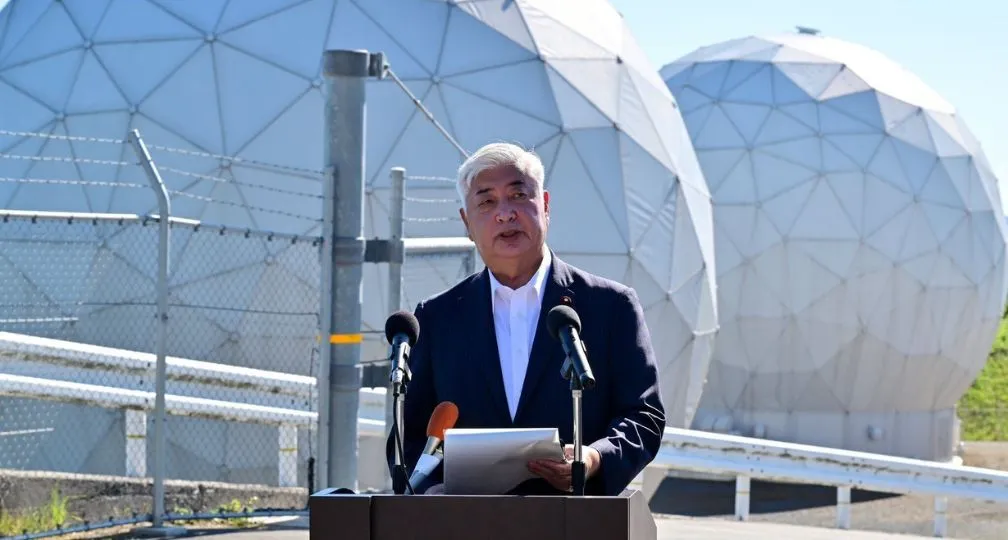Japan’s Space Domain Defense Guidelines: Background, Key Features, and Policy Implications

Defense Minister Nakatani explained that the Guidelines are intended to clarify the Ministry of Defense and the Self-Defense Forces' approach to space security, while also increasing predictability for private companies and thereby deepening public-private cooperation[2]. But why is this necessary now? This commentary will explain the background and overview of the Guidelines, as well as their main features.
The history of national security space in Japan
In Japan, space development has long been centered on civilian applications such as science and exploration. A resolution by the Diet in 1969 established that space development and utilization would be strictly limited to peaceful purposes, thereby severely restricting any military use of space[3]. With the enactment of the Basic Space Law in 2008, the use of space for security purposes became legally permissible, enabling the Ministry of Defense (MoD) and the Self-Defense Forces (SDF) to develop, operate, and possess space systems.
However, there was a heavy price to pay for the long-standing strict restrictions on the use of space for security purposes. At the time the Law was enacted, the MoD and the SDF lacked the human resources, knowledge, and budget necessary for space development. Additionally, the role of “space” in defense policy was not clearly defined.
The 2018 National Defense Program Guidelines marked a significant turning point in the situation and provided an opportunity for the MoD and SDF to earnestly pursue the development of its space domain capability. The 2018 Program Guidelines called for the establishment of a “Multi-Domain Defense Force” and highlighted the need to build capabilities in the fields of space, cyber, and electromagnetic warfare to achieve this goal[4]. Following the 2018 Program Guidelines, the SDF established its first space-specialized unit, the Space Operations Unit, in 2020. Furthermore, the National Security Strategy adopted in 2022 reaffirmed the importance of space, and the following year, the Strategic Headquarters for Space Development decided on the Space Security Initiative with the aim of specifying issues and policies in space security[5].
Overview of the Space Domain Defense Guidelines
As described above, the significance of the space domain in Japan’s defense policy has been repeatedly confirmed in government policy documents. However, the Space Domain Defense Guidelines represent the first policy document that systematically organizes the Ministry of Defense’s policies and initiatives in the space domain. In light of the Russia-Ukraine war, which has underscored the critical role of space in modern conflict, the MoD’s Guidelines hold particular importance.
The Guidelines point to China and Russia’s space-related activities as examples and assert that “space has become a warfighting domain, and threats and risks in space are growing. The Mod and SDF will urgently enhance their defense capabilities in space, amplify their capabilities in all domains, and aim to ensure the use of space under any circumstances.”
To achieve this, the Guidelines outline four key approaches, each accompanied by specific measures (the following examples are provided solely for illustrative purposes):
(1) Rapid and Accurate Situational Awareness
-Example: Development of capabilities to detect and track moving targets in real time
(2) Securing Satellite Communications as the Basis for Operations
-Example: Development of a multi-layered, highly resilient communications satellite
network
(3) Mission Assurance
-Example: Building capabilities necessary for protecting satellites
(4) Disruption of the Adversary’s Command, Control, and Communications
-Example: No specific example provided
Many of the specific initiatives listed are existing projects, and the significance of the guidelines lies in organizing their roles and functions in the policy document.
Features of the Guidelines
First, the Guidelines explicitly state that they will “contribute to the radical strengthening of Japan’s defense capabilities as outlined in the National Security Strategy and other documents through the enhancement of defense capabilities in the space domain by the Ministry of Defense and the Self-Defense Forces.” This connection between improving space defense capabilities and broader defense enhancements in the National Security Strategy is one of the most distinctive features of the Guidelines.
The National Security Strategy specifies the functions and capabilities necessary for strengthening Japan’s defense, such as “stand-off defense capabilities” and “integrated air and missile defense capabilities.” The Guidelines emphasize that developing space capability is a vital component for achieving these functions and capabilities.
Second, the Guidelines repeatedly emphasize the utilization of commercial space services. As explained by Defense Minister Nakatani, the intention is to improve “predictability” for industry by demonstrating government demands to the private sector.
This is the right direction, considering that Japan’s space industry, with the exception of the satellite communications sector, remains dependent on government demand and that the establishment of a vibrant and resilient space industry is the foundation of Japan’s defense space capabilities.
Third, the MoD’ efforts to ensure the “mission assurance” of space systems have been expanded to include not only space domain awareness but also cybersecurity for space systems and the development of satellite protection capabilities.
The mission assurance function has been a topic of discussion for many years. The Cabinet Office’s Space Policy Committee defines it as “the ability to ensure that the objectives of a space system are achieved continuously and reliably. This involves detecting and avoiding threats and risks, enhancing the system’s resilience, and restoring functions promptly, even when threats and risks in the space domain have been apparent” [6].
Fourth, although the Guidelines state to strengthen capabilities to disrupt the adversary’s command, control, and communications, the document notably lacks specific measures to address this. Regarding offensive counterspace capabilities, even the US Space Force treats them as highly classified information, so there is only a handful of information available on specific capabilities[7]. The Defense Buildup Program decided in December 2022 states that “as a response to the space domain, we will further strengthen our capabilities to disrupt the command, control, and communications of the adversary,” suggesting that the MoD has been developing some counterspace capabilities, but it is presumed that they have decided not to disclose specific initiatives[8].
Future challenges
Despite progress, there are still several challenges ahead. Three points are highlighted here. First, while the Guidelines indicate the “policy direction” and concrete “initiatives,” they do not address the “concept of operations” that effectively connects these two aspects. In other words, the MoD needs to develop the concept of operations to integrate space and terrestrial forces to strengthen Japan’s overall defense capabilities.
Second, while the Guidelines provide a framework for organizing various initiatives in terms of policy, it will also be necessary to set appropriate priorities. Although the overall budget of the Ministry of Defense has been increasing, it is not realistic to proceed with all projects as top priorities, given the various resource constraints. For example, even if the Self-Defense Forces aim to build satellite defense capabilities, they currently only operate three satellites. Therefore, it is necessary first to increase the number of national security space systems in orbit.
Third, while the utilization of commercial space services is in the right direction, it also carries the risk of private companies becoming involved in the escalation of conflicts between nations. When the MoD and SDF utilize commercial space services, it will be necessary to set the risks on the private sector side within manageable limits. Clarifying the division of roles, risk management frameworks, and scope of responsibility between the government and private companies is an urgent task.
Despite these remaining challenges, the significance of the formal adoption of the Guidelines as the policy of the Ministry of Defense cannot be emphasized more, given the increasingly severe security environment surrounding Japan. The development of space domain capabilities within the MoD and SDF remains in its early stages, and the guidelines are not an end goal but rather a stepping stone toward future efforts to accelerate concrete initiatives.
(Photo Credit: Japan’s Ministry of Defense )
注
- [1]Ministry of Defense, “Space Domain Defense Guidelines [in Japanese],” July 2025,
https://www.mod.go.jp/j/press/news/2025/07/28a_02.pdf - [2] “Temporary Press Conference by the Minister of Defense [in Japanese],” July 28, 2025,
https://www.mod.go.jp/j/press/kisha/2025/0728a_r.html - [3] Kazuto Suzuki, “Transforming Japan’s Space Policy-Making,” Space Policy, Vol. 23, No. 2, 2007, pp. 73–80, https://doi.org/10.1016/j.spacepol.2007.02.001
- [4] Cabinet Secretariat, “National Defense Program Guidelines for FY 2019 and beyond,” December 2018, https://www.mod.go.jp/j/policy/agenda/guideline/2019/pdf/20181218_e.pdf
- [5] Cabinet Secretariat, “National Security Strategy,” December 2022,
https://www.cas.go.jp/jp/siryou/221216anzenhoshou/nss-e.pdf;
Space Development, “Space Security Initiative,” June 2023, https://www8.cao.go.jp/space/anpo/kaitei_fy05/enganpo_fy05.pdf. - [6] Cabinet Office Space Policy Committee Space Security Subcommittee “Basic Considerations on Strengthening Mission Assurance for the Entire Space System [in Japanese],” February 16, 2017,
https://www8.cao.go.jp/space/comittee/dai57/siryo1-1.pdf. - [7] For details on the status of public disclosure of counter-space capabilities by the United States and other countries, see the following: Yasuhito Fukushima, “Has Space Begun to Be Viewed as a ‘Normal’ Military Domain? Insights from the Public Disclosure of Counterspace Capabilities [in Japanese],” Security & Strategy, Vol. 5, No. 2, 2025, pp. 95–114.
- [8] Cabinet Secretariat, “Defense Buildup Program,” December 2022,
https://www.mod.go.jp/j/policy/agenda/guideline/plan/pdf/program_en.pdf.


Research Fellow
Kota Umeda is a research fellow at the Institute of Geoeconomics at the International House of Japan. From 2015 to 2025, he worked at the Japan Aerospace Exploration Agency (JAXA), where he focused on researching U.S. space policy, coordinating with other space agencies, and developing JAXA's cybersecurity policy and incident response strategies. From 2019 to 2022, Mr. Umeda served as JAXA's liaison officer in Washington, D.C., collaborating with the U.S. government, industry leaders, and various stakeholders to promote Japan-U.S. space cooperation. Prior to his career in the space sector, Mr. Umeda spent five years at the Japan Ministry of Defense, where he researched military activities surrounding Japan and contributed to the formulation of arms control and disarmament policies. He holds a Master of Laws from Kyoto University and a Bachelor's degree in Policy Studies from Kwansei Gakuin University.
View Profile-
 Fed-Treasury Coordination as Economic Security Policy2026.02.13
Fed-Treasury Coordination as Economic Security Policy2026.02.13 -
 Challenges for Japan During the U.S.-China ‘Truce’2026.02.12
Challenges for Japan During the U.S.-China ‘Truce’2026.02.12 -
 India and EU Sign Mother of All Deals2026.02.09
India and EU Sign Mother of All Deals2026.02.09 -
 Orbán in the Public Eye: Anti-Ukraine Argument for Delegitimising Brussels2026.02.04
Orbán in the Public Eye: Anti-Ukraine Argument for Delegitimising Brussels2026.02.04 -
 Trump, Takaichi and Japan’s Strategic Crossroads2026.02.03
Trump, Takaichi and Japan’s Strategic Crossroads2026.02.03
 Oil, Debt, and Dollars: The Geoeconomics of Venezuela2026.01.07
Oil, Debt, and Dollars: The Geoeconomics of Venezuela2026.01.07 Orbán in the Public Eye: Anti-Ukraine Argument for Delegitimising Brussels2026.02.04
Orbán in the Public Eye: Anti-Ukraine Argument for Delegitimising Brussels2026.02.04 When Is a Tariff Threat Not a Tariff Threat?2026.01.29
When Is a Tariff Threat Not a Tariff Threat?2026.01.29 Fed-Treasury Coordination as Economic Security Policy2026.02.13
Fed-Treasury Coordination as Economic Security Policy2026.02.13 A Looming Crisis in U.S. Science and Technology: The Case of NASA’s Science Budget2025.10.08
A Looming Crisis in U.S. Science and Technology: The Case of NASA’s Science Budget2025.10.08
















